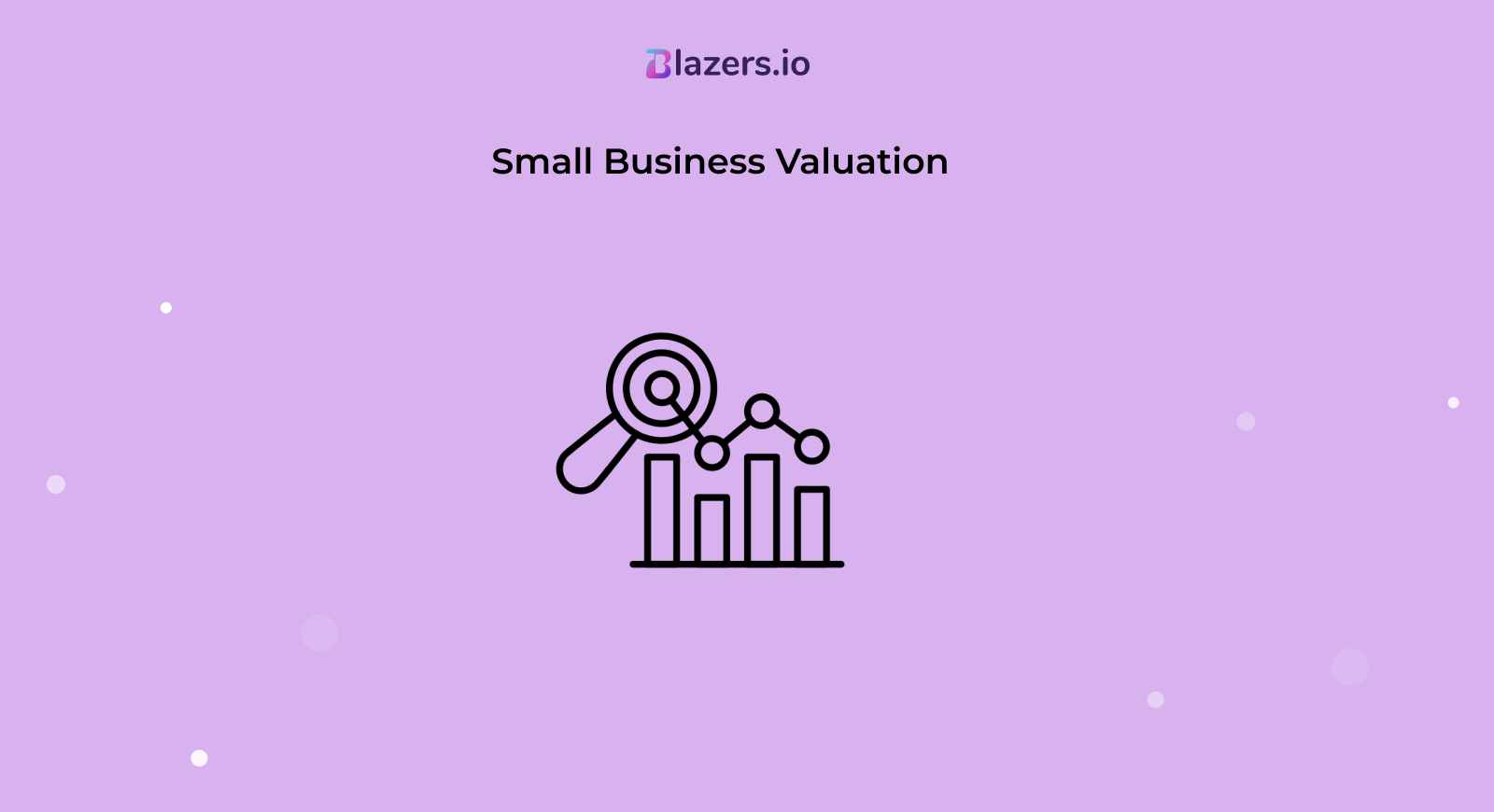Published at business by Sael

Small Business Valuation Methods: The Definitive Guide
Published at business by Sael
Small businesses have been widely recognized as the backbone of the global economy, given their vital contribution to innovation, community building, and overall economic resilience in our daily lives.
Source: https://www.oberlo.com/
So, it is essential to encourage and perform Valuation for small businesses. The latest statistics show that more than 20 percent of small enterprises fail in the first year, and nearly 50 percent of small start-ups fail within the first five years (Bureau of Labor Statistics, 2021).
So, what is small business valuation, and how to do it? This blog gives detailed information about small business valuation and its methods with real-time examples.
Table of Contents
1. What is small business valuation and its importance
2. Small business valuation methods
2.1. Asset-Based Valuation
2.2. Market-Based Valuation
2.3. Earning-Based Valuation
3. Real-life case studies: Success story of a business that mastered Valuation
4. Conclusion
1. What is small business valuation and its importance
The process of figuring out how much a small business is worth in terms of money is called "Small business Valuation." Several things make this number necessary:
Making decisions: Knowing how much your business is worth helps you make good choices. It lets you decide how to sell your business, find partners, or plan for growth.
Attracting Investors: Investors need to know how much a business is worth before spending. A precise valuation can draw in potential buyers.
Selling or buying: When selling or buying a small business, it's essential to know how much it's worth so everyone gets a good deal.
Financial Health: Valuation gives you information about the financial health of your business and can help you find places to make improvements.
Succession planning: Succession planning is vital for family businesses that want to pass the company on to the next generation.
Small business valuation is the process of determining your company's value to make sound decisions and attract the proper possibilities.
2. Small business valuation methods
There are different types of small business valuation methods. The first is Asset-based Valuation.
2.1. Asset-Based Valuation
Asset-based Valuation is a method for calculating the worth of a small firm by adding up all of its assets and removing any debts or obligations. It's similar to figuring out the overall value of everything a company possesses, much like you may figure out the total value of everything you own at home.

The steps in Asset-Based Valuation are:
1. Identify Assets:
The first stage is to list and categorize all of the assets owned by the company:
- Physical assets like building, equipment, and inventory.
- Assets that are intangible, like patents, trademarks, etc.
- Financial assets like the cash available in the bank.
2. Determine Asset Values:
After you've made a list of your assets, you'll need to figure out how much each is worth. In the case of physical goods, this could mean getting an appraisal or using their book values. It can be harder to determine intangible goods' value because they can't be seen or touched.
3. Account for Liabilities:
If you have loans or any financial obligations, you have to subtract them from the assets calculation.
4. Calculate the Net Asset Value:
So, you will get the asset value after subtracting the debts from the total assets. This calculation is the estimate of the business's worth.
5. Consider Intangibles:
Sometimes, the asset-based Valuation will not cover the total value of the business. Certain factors like loyal customer base brand value are intangibles that might be worth a lot and cannot be projected in the balance sheets.
Asset-based Valuation is a method that involves assessing the worth of a property by averaging the value of its land, building, and internal assets while also accounting for any outstanding loans or mortgages associated with the property. Although it may not fully account for the potential value of intangible assets and future earnings, it offers a cautious estimate of a business's value based on its documented and physical assets. It is one of the best small business valuation methods.
2.2. Market-Based Valuation
Market-based Valuation is a method used to determine the value of a small business by comparing it to recently sold comparable companies. It is one of a method for small business valuation. It's like figuring out how much your used car is worth by seeing how much other cars like it have sold in your area.

The steps in Market-Based Valuation are:
1. Identify comparable businesses:
The first step in market-based Valuation is to find the businesses similar to yours that have been sold recently. The companies you select for Valuation should be identical regarding industry, size, location, and other needed factors.
2. Collect the sales data:
Once you've found similar businesses, find out how much they sold for. This information could come from public records, business brokers, or reports on the field. You're trying to discover how much these businesses were worth when they changed hands. Sales data collection is essential in small business valuation methods.
3. Analyze the Data:
Now that you have the sales data, you can start to compare. You'll look at things like the size of the business, how much money it makes, how profitable it is, and anything else that makes it stand out. By comparing these things to your business, you can determine how the market might value it.
4. Calculate your Business's Value:
You can estimate the value of your business based on the information you've collected and the comparisons you've made. If similar companies sold for a specific price, it's reasonable to think your business might be worth the same amount.
5. Adjust for Differences:
Every business is different, so you may need to change the number based on the differences between yours and those you're comparing it to.
6. Consider Market Trends:
Market circumstances may also affect Valuation. If businesses in your area are in high demand, prices might be higher. On the other hand, a downturn in the business or industry could affect the value.
It is a valuable and popular technique for determining the worth of a small business since it gives you an idea of what the market is prepared to pay for companies similar to yours. But it might not be as true if there aren't many sales that are similar or if your business is different in some way.
2.3. Earnings-Based Valuation
The third method in small business valuation is earnings-based Valuation. Earnings-based valuation is a way of determining the worth of a small business based on how much money it makes.

The steps in this small business valuation method are:
1. Earnings:
The company's profits determine the main idea behind Earnings-Based Value. Profit is the amount left over after all of a business's costs, like rent, pay, and supplies, have been taken out of its income.
2. Earnings Before Interest and Taxes (EBIT):
This measures the company's earnings before interest and taxes are deducted.
3. Earnings Before Interest, Taxes, Depreciation, and Amortization (EBITDA):
This goes further by leaving out depreciation (the loss of value of things like equipment) and repayment (the spreading out of costs over time). It's used a lot by tech companies and new businesses.
4. Price-to-Earnings (P/E) Ratio:
If a company's shares are publicly traded, this ratio compares the stock price to its earnings per share.
5. Future Earnings:
Earning-based valuation depends on how much money is the business making right now and also the potential for future earnings of the business.
6. Risk and Uncertainty:
The business's associated risks and uncertainties are also factored into the Valuation.
7. Calculating Value:
You may determine the business's value if you have a firm grasp of its earnings, prospects, and risk factors. This can be done with the help of different methods and financial models that take all of these things into account.
In short, Earnings-Based Valuation is like finding out how much your business is worth by looking at how much money it makes, how much money it might make in the future, and how risky it is. It's a good way to figure out how much a small business is worth based on its ability to make money, which investors, buyers, and business owners see as a key sign of its value.
3. Real-life case studies: Success story of a business that mastered Valuation
Nykaa:
Nykaa, an Indian e-commerce site dedicated to cosmetics and personal care, began as a modest company in 2012. The small business valuation methods were used by this company.

Nykaa's value is likely affected by an array of things, such as market-based Valuation and earnings-based Valuation:
1. Market-Based Valuation:
The market conditions and trends in the eCommerce business, especially the beauty and cosmetics sector, could affect how much Nykaa is worth. They can assess their market value by contrasting their growth potential and performance with those of other e-commerce businesses in India and around the world.
2. Earnings-Based Valuation:
Nykaa may take into account their profitability and earnings in their Valuation, given their strong market presence and expanding clientele. They might look at their income, profit margins, and growth rate to figure out how much they are worth based on their ability to make money.
As Nykaa emerged as India's preferred source of beauty products, its Valuation skyrocketed. Their focus on customer interaction and product quality was a big part of why they were valued so highly and helped them become a leader in the Indian e-commerce space.
These case studies show how technology, innovation, and customer-centred approaches and small business valuation methods can help small businesses in India understand Valuation. By knowing their niche markets and giving customers great value, these businesses were able to grow and be worth a lot more.
4. Conclusion
This blog explains in detail the small business valuation methods. Valuation is more than just numbers in the world of small enterprises, where storytelling is essential, customer relationships are crucial, and innovation is the heartbeat of every entrepreneur. It's about displaying your potential to investors, assuring lenders, and laying the groundwork for your next chapter.
Your small business can succeed and reach new heights you've only ever dreamed of if you have the correct valuation strategy in place and an unbreakable determination. It is your story, your worth, and your destiny; therefore, go out and make it matter. The world is waiting to see the magnificence you bring to the small business landscape.





